The Health Ministry has defended its decision to endorse the Covid-19 vaccine from Pfizer-BioNTech as the preferred vaccine for administering booster shots to people who previously received the Sinovac vaccine.
Moreover, it also unveiled a proposed plan that would see most vaccine recipients eventually get a Pfizer booster once given the green light by the National Pharmaceutical Regulatory Agency (NPRA).
Nevertheless, it will still be possible for Sinovac vaccine recipients to receive either the AstraZeneca vaccine or Sinovac vaccine for their third dose once this is approved by the NPRA if they are medically unable to receive the Pfizer shot.
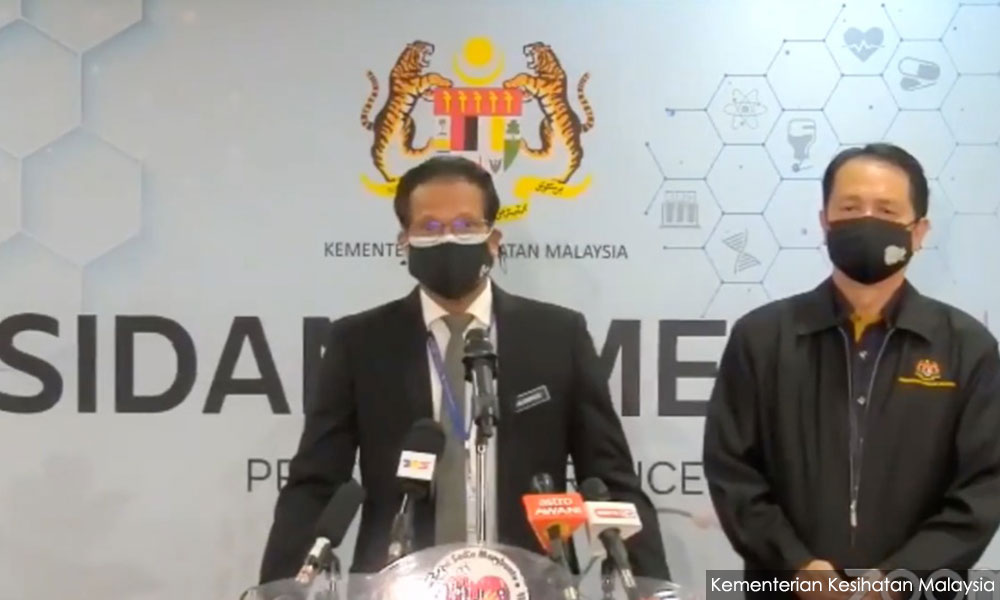
“The Pfizer vaccine is recommended by default because that is the priority. Data from the study in Thailand shows the same.
“Therefore, we will go with Pfizer unless there is a medical contraindication. Then of course the other adenoviral platform which is AstraZeneca or the Sinovac that is being given will be considered by the physicians.
“This is something we already have experienced in the rollout because those who cannot the Pfizer vaccine subsequent to an allergic reaction were given Sinovac.
“Same issues here, so we will go with Pfizer first,” said Institute for Clinical Research director Dr Kalaiarasu Periasamy at a press conference in Putrajaya today.
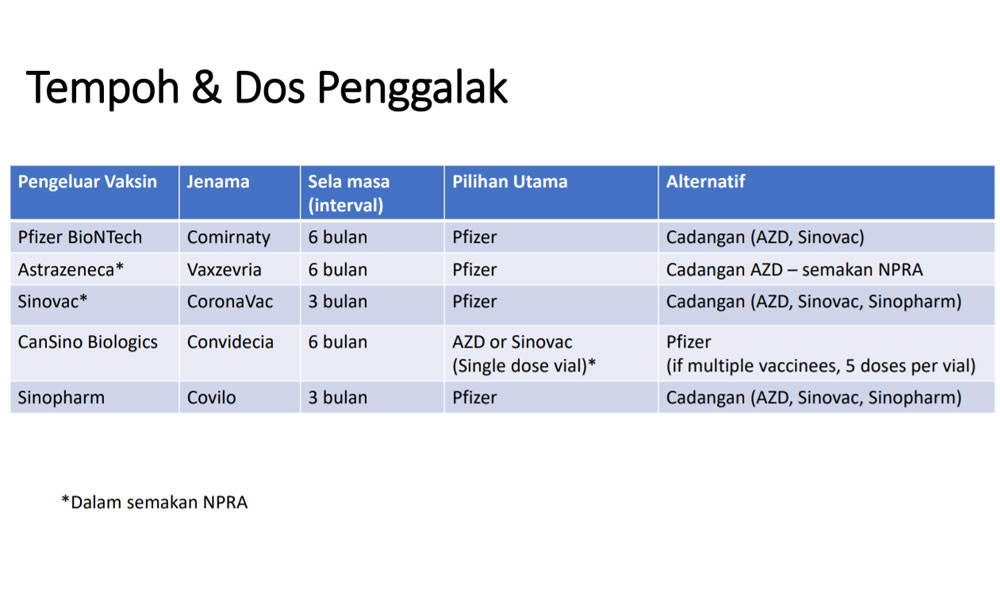
The press conference comes amid widespread vaccine hesitancy towards the Health Ministry rollout of Covid-19 booster shots, especially when it comes to heterologous vaccinations where Sinovac vaccine recipients would get the Pfizer vaccine for their booster shot.
“Heterologous” boosters refer to giving a booster shot that is of a different type than the vaccine used for the primary vaccination, as opposed to “homologous” boosters where the same vaccine is used.
Health Ministry director-general Dr Noor Hisham Abdullah said both Sinovac and AstraZeneca have submitted their dossiers to apply for their respective Covid-19 vaccines to be used as booster shots, and both are undergoing review ahead of the Drug Control Authority (DCA) meeting on Nov 17.
To date, the Pfizer vaccine is the only vaccine approved to be used as a booster shot by the NPRA and DCA.
It is currently being prioritised for healthcare workers, senior citizens above 60 years old, residents at long-term care facilities, people above 18 years old with comorbidities, and finally people above 40 years old.
It will be later be expanded to include pregnant women and other frontliners.
Sinovac vaccine effectiveness plummets after 3 months
The boosters will be administered six months after a person has completed his primary vaccination series, except for Sinovac vaccine recipients who will be eligible for their booster shots three months after their second dose.
Kalaiarasu said this is because the Health Ministry Recovam study has found that the effectiveness of the Sinovac vaccine wanes significantly over the period.
He said the study found that the vaccine is 76.1 percent effective in preventing Covid-19 infection during the period one or two months after full vaccination, but this plummets to just 27.9 percent during the period three to five months after full vaccination.
For comparison, the same study found the Pfizer vaccine’s effectiveness drops only from 88.7 percent to 68.0 percent over the same period.
He also presented US data to show that the Pfizer vaccine’s protection against Covid-19 infection wanes for all age groups except those between 12-15 years old, although there are only four months of follow-up data available for that age group.
Similar to the Malaysian study, he showed that effectiveness is high at 88 percent in the first month after full vaccination but falls to just around 60 percent within five months. At or beyond five months, effectiveness drops further to 47 percent.
Protection against hospitalisation remains high with at least 88 percent effectiveness, but Kalaiarasu noted that the US employs a narrower hospital admission criterion compared to Malaysia.
He said people hospitalised for Covid-19 in the US generally require supplementary oxygen or worse, whereas Malaysia also considers other risk factors such as age and the presence of comorbidities.
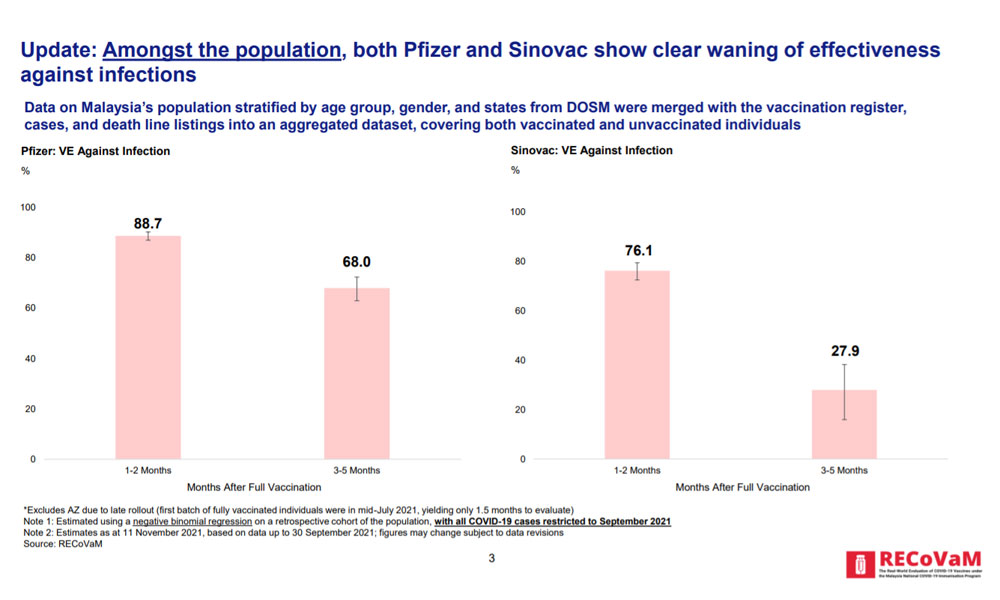
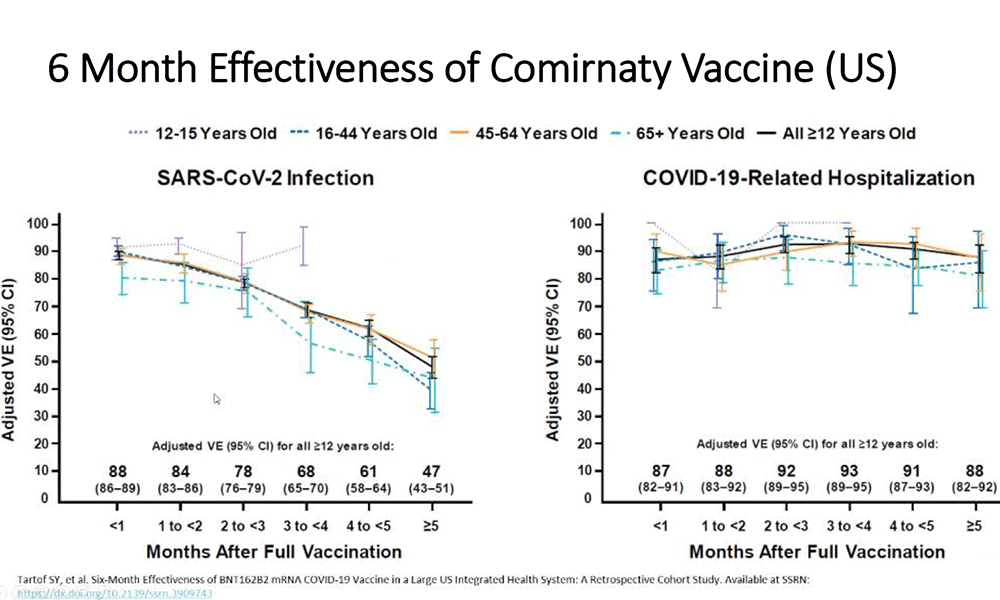
Kalaiarasu, who chairs the Vaccine Selection Technical Working Group, also presented data from ‘mix-and-match’ studies abroad.
He said data from Thailand shows that when Sinovac vaccine recipients are given a heterologous booster with either an AstraZeneca or Pfizer shot, they produce very high levels of antibodies that would protect against Covid-19.
In terms of real-world effectiveness, he said a study in Chile saw two million Sinovac vaccine recipients get either a Sinovac, Pfizer, or AstraZeneca booster.
This was found to increase the vaccine’s protection against infection and against hospitalisation from 56 percent and 84 percent respectively, but the extent of the increase varies by the booster shot given.
The effectiveness of a Sinovac booster shot was increased to 80 percent against infection and 88 percent against hospitalisation, respectively.
The figure is 90 percent (infection) and 87 percent (hospitalisation) for the Pfizer vaccine, and 93 percent (infection) and 96 percent (hospitalisation) for the AstraZeneca vaccine.
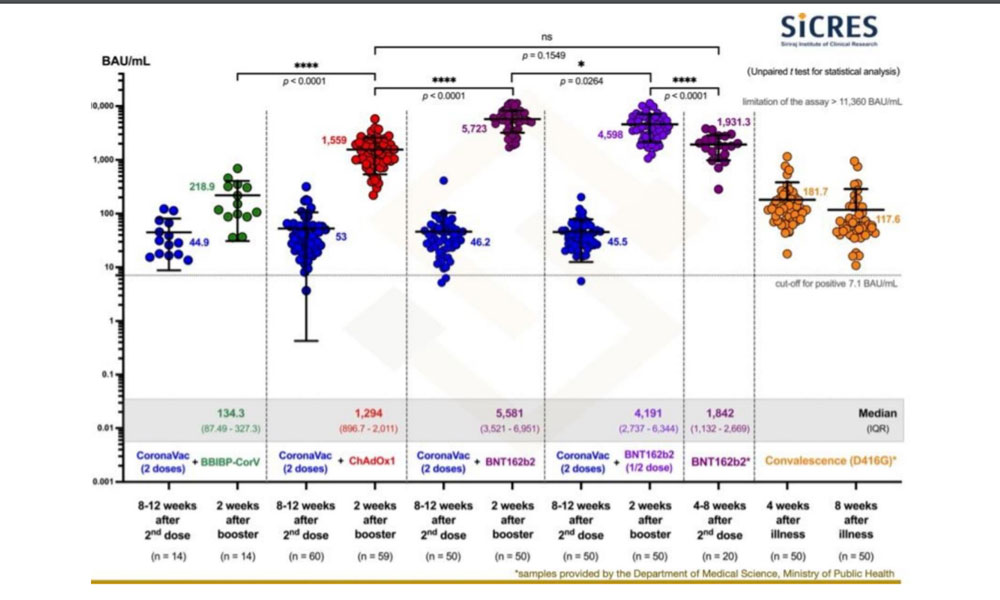
For Malaysia, Kalaiarasu said the Recovam study will look into the effectiveness of the booster vaccine rollout in preventing Covid-19 over the course of the year.
Viral WHO video ‘outdated’ with newer data
Meanwhile, Noor Hisham address a video circulating online where WHO top officials urged caution for ‘mix-and-match’ vaccine regimens.
He said the video was recorded in July where the evidence of heterologous vaccinations was still unclear, but the situation has changed.
“So, these are the scientific studies that we have now. So far, we have rollout booster shots namely Pfizer-Pfizer-Pfizer for Pfizer vaccine recipients; and for the Sinovac vaccine that is widely used in Malaysia, we can use the Pfizer or AstraZeneca vaccine.
“This will give better effectiveness which is 90 percent as shown in the Chilean study. We encourage Malaysians: If you have been given an appointment for a booster shot, we find that 40 percent do not turn up for their appointment.
“We advise that they come forward to get the booster dose,” he said.
Previously, Health Minister Khairy Jamaluddin had warned that if the uptake of booster doses are low, Covid-19 hospitalisation rates will increase.
The warning comes as the months-long decline in Covid-19 cases in Malaysia starts to plateau, and Noor Hisham has urged for better compliance with standard operating procedures to avert a surge in cases. - Mkini




No comments:
Post a Comment
Note: Only a member of this blog may post a comment.